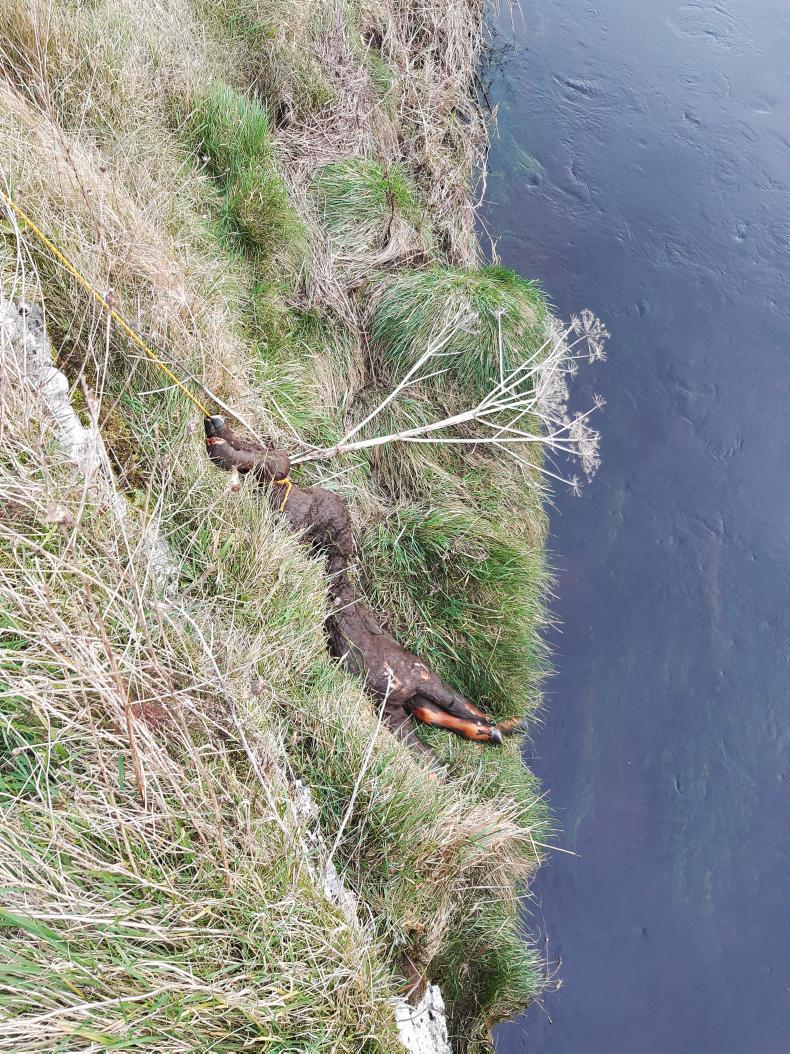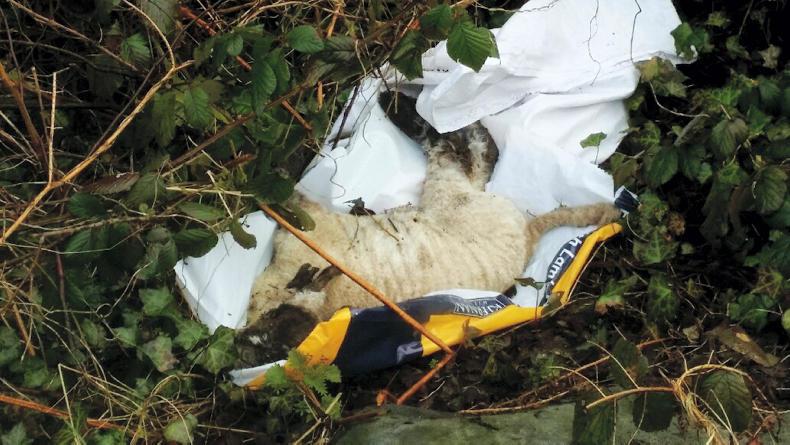There has been a concerning increase in dead animal dumping this year in Galway, particularly since the COVID-19 restrictions came into play, county veterinary officer Rita Gately told the Irish Farmers Journal.
“The increase began in February coinciding with a wet spell of weather. We regularly deal with many cases of ewes, lambs, calves and horses being dumped illegally.”
Water contamination
Gately revealed that a significant number of young calves and lambs have been dumped close to water extraction points.
“We recently dealt with a calf dumped on a river shore, close to an extraction point for drinking water.
“This has dangerous potential to expose the community to pathogenic bacteria and cryptosporidium through the contamination of the water supply.
Calf dumped on a river bank in Co Galway.
“The calf in this example isn’t tagged but could potentially be traced to the owner of the dam through DNA analysis.”
DNA tracing
Last year, Galway County Council responded to an incident where eight cattle carcases were buried on the edge of a bog.
Gately said: “We took DNA samples but unfortunately found no trace for these animals.
“In order for DNA tracing to work we need to have a strong suspicion of where the animals came from and the genomic database needs to be more detailed.
“As the database grows in future, we expect to find matches for these animals.”
Gately claims her department has the ability to freeze DNA samples and use them at a later stage when the database is detailed enough to find matches.
“It’s possible this will work in the near future and once we find a DNA match it’s very conclusive where the animal came from.”
Enforce legislation
Galway County Council has also responded to a number of cases relating to the illegal dumping of dead horses.
Horse dumped on a river bank in Co Galway.
Gately said: “In one case, a horse was found dead close to a river in a field with other horses, none of which were microchipped.
“We scan all horses when we find them but as of yet, not one has been chipped.
“Chipping horses is required by the Department of Agriculture’s equine ID legislation. We need greater enforcement of this law from the Department in order to combat illegal dumping.”
Read more
DNA tracing to combat dead animal dumping along border
Mayo farmer finds suite of furniture dumped on roadside
Cork farmer finds truckload of builder's rubble dumped in field
There has been a concerning increase in dead animal dumping this year in Galway, particularly since the COVID-19 restrictions came into play, county veterinary officer Rita Gately told the Irish Farmers Journal.
“The increase began in February coinciding with a wet spell of weather. We regularly deal with many cases of ewes, lambs, calves and horses being dumped illegally.”
Water contamination
Gately revealed that a significant number of young calves and lambs have been dumped close to water extraction points.
“We recently dealt with a calf dumped on a river shore, close to an extraction point for drinking water.
“This has dangerous potential to expose the community to pathogenic bacteria and cryptosporidium through the contamination of the water supply.
Calf dumped on a river bank in Co Galway.
“The calf in this example isn’t tagged but could potentially be traced to the owner of the dam through DNA analysis.”
DNA tracing
Last year, Galway County Council responded to an incident where eight cattle carcases were buried on the edge of a bog.
Gately said: “We took DNA samples but unfortunately found no trace for these animals.
“In order for DNA tracing to work we need to have a strong suspicion of where the animals came from and the genomic database needs to be more detailed.
“As the database grows in future, we expect to find matches for these animals.”
Gately claims her department has the ability to freeze DNA samples and use them at a later stage when the database is detailed enough to find matches.
“It’s possible this will work in the near future and once we find a DNA match it’s very conclusive where the animal came from.”
Enforce legislation
Galway County Council has also responded to a number of cases relating to the illegal dumping of dead horses.
Horse dumped on a river bank in Co Galway.
Gately said: “In one case, a horse was found dead close to a river in a field with other horses, none of which were microchipped.
“We scan all horses when we find them but as of yet, not one has been chipped.
“Chipping horses is required by the Department of Agriculture’s equine ID legislation. We need greater enforcement of this law from the Department in order to combat illegal dumping.”
Read more
DNA tracing to combat dead animal dumping along border
Mayo farmer finds suite of furniture dumped on roadside
Cork farmer finds truckload of builder's rubble dumped in field








 This is a subscriber-only article
This is a subscriber-only article










SHARING OPTIONS: